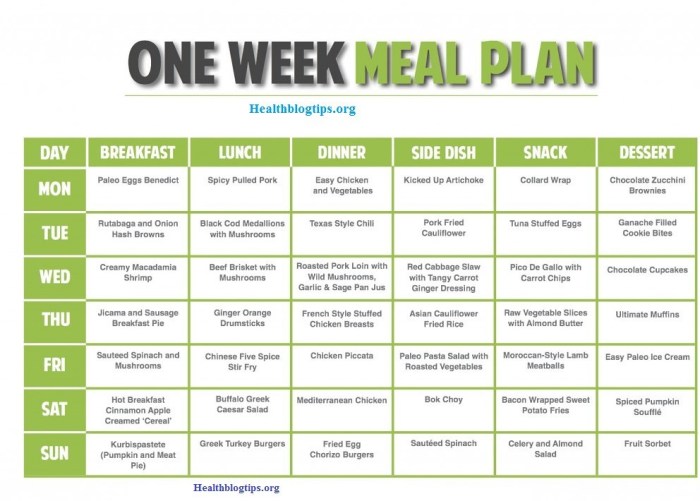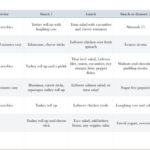Beach Diet 1 Week: Want a beach-ready body fast? Many quick-fix diets promise rapid weight loss, but the reality often involves restrictive eating, potential health risks, and ultimately, unsustainable results. This guide cuts through the marketing hype, offering a balanced, 7-day plan focused on whole foods and sustainable habits. We’ll explore a sample meal plan, hydration strategies, exercise routines, and crucial tips to help you achieve your goals without sacrificing your well-being.
Forget the crash diets. We’ll focus on building a healthier relationship with food, incorporating delicious recipes and practical strategies to help you look and feel your best. This isn’t just about shedding pounds for a week; it’s about establishing long-term healthy habits that will benefit you long after your vacation ends. We’ll address common challenges, like cravings and social situations, and emphasize the importance of professional guidance to ensure you’re making safe and effective choices.
Understanding the “Beach Diet” Concept

The term “Beach Diet” is a colloquialism referring to various fad diets marketed for rapid weight loss before a vacation. These diets often promise dramatic results in a short timeframe, typically a week or two, capitalizing on the desire for a slimmer physique for beach outings. However, understanding the true nature of these diets is crucial to avoid potential health risks and unrealistic expectations.These diets typically share several characteristics.
They frequently involve severe calorie restriction, often below the recommended daily intake for maintaining a healthy metabolism. They may also promote the elimination of entire food groups, such as carbohydrates or fats, leading to nutritional deficiencies. Furthermore, they often emphasize rapid detoxification or cleansing, which are largely unsubstantiated claims. The overall approach prioritizes short-term aesthetic goals over long-term health and sustainable weight management.
Potential Dangers of Restrictive, Short-Term Diets
Rapid weight loss achieved through restrictive diets often comes at a cost. Such diets can lead to muscle loss, rather than solely fat loss, impacting metabolism and potentially resulting in weight regain once normal eating patterns resume. Furthermore, nutrient deficiencies stemming from eliminating entire food groups can negatively affect energy levels, immune function, and overall well-being. The yo-yo effect, characterized by cycles of weight loss and regain, can also be detrimental to both physical and mental health.
The stress placed on the body by drastic calorie reduction can also negatively impact various organ systems. For example, severely restricting calories can lead to decreased thyroid function, affecting metabolism and energy levels. Moreover, these diets often lack essential nutrients, potentially resulting in fatigue, weakness, and hair loss.
Misleading Marketing Tactics in Beach Diet Promotion
Many “Beach Diets” employ misleading marketing tactics to attract consumers. Before-and-after photos often showcase dramatic transformations, but these rarely reflect the typical results and may be heavily edited or selectively chosen. Testimonials are frequently used, but their authenticity is often questionable. Many advertisements emphasize quick fixes and miracle solutions, promising unrealistic weight loss within a short timeframe.
The use of celebrity endorsements further adds to the allure, but these endorsements rarely reflect the endorsement’s actual experience with or belief in the diet. Vague scientific claims and jargon are often employed to lend an air of credibility, while neglecting to provide concrete evidence or cite reputable studies. For instance, a diet might claim to “boost your metabolism” without specifying the mechanisms involved or providing evidence supporting this claim.
Finally, these diets frequently lack transparency regarding the potential side effects and risks associated with the restrictive approach.
Hydration and Exercise
Staying hydrated and incorporating regular exercise are crucial components of any successful weight-management strategy, especially when aiming for a beach-ready physique. These elements work synergistically; adequate hydration supports your body’s metabolic processes and exercise performance, while exercise itself contributes to overall health and calorie expenditure. Ignoring either aspect significantly undermines your efforts.Adequate water intake is essential for numerous bodily functions, impacting everything from nutrient absorption and waste removal to temperature regulation and energy levels.
For weight management, water plays a key role in satiety, helping you feel fuller for longer and potentially reducing overall calorie consumption. Dehydration, on the other hand, can lead to increased hunger and fatigue, hindering your exercise performance and making it more challenging to stick to your diet.
Daily Hydration Schedule
Maintaining consistent hydration throughout the day is key. A simple approach involves distributing your daily water intake across several intervals. The following schedule serves as a guideline; adjust it based on your individual needs, activity levels, and climate. Remember that factors like sweating during exercise will increase your fluid requirements.
- 7:00 AM: 2 cups of water (immediately upon waking)
- 9:00 AM: 1 cup of water
- 11:00 AM: 1 cup of water
- 1:00 PM: 2 cups of water (after lunch)
- 3:00 PM: 1 cup of water
- 5:00 PM: 1 cup of water
- 7:00 PM: 2 cups of water (after dinner)
- Before bed: 1 cup of water (if needed)
Note: This schedule totals approximately 10 cups of water. Individual needs may vary. Consider increasing intake during hot weather or intense physical activity.
Moderate-Intensity Exercise Routine (7 Days)
This routine combines cardio and strength training, promoting both cardiovascular health and muscle development. Remember to consult your doctor before starting any new exercise program. Proper form is crucial to prevent injuries. Rest days are incorporated to allow your body to recover and rebuild.This plan focuses on moderate intensity; you should be able to hold a conversation while exercising.
Listen to your body and adjust the intensity or duration as needed.
- Day 1: Cardio
-30 minutes brisk walking or jogging. Example: A brisk walk around your neighborhood or a jog on a treadmill. - Day 2: Strength Training
-Focus on upper body. Example: 10-12 repetitions of push-ups, dumbbell rows, and overhead presses. Two sets of each exercise. - Day 3: Cardio
-30 minutes cycling or swimming. Example: A cycling session outdoors or at a gym, or laps in a swimming pool. - Day 4: Rest
-Active recovery such as light stretching or a leisurely walk. - Day 5: Strength Training
-Focus on lower body. Example: 10-12 repetitions of squats, lunges, and calf raises. Two sets of each exercise. - Day 6: Cardio
-30 minutes of your choice (yoga, HIIT, etc.). Example: A high-intensity interval training (HIIT) workout, or a session of yoga. - Day 7: Rest
-Complete rest or light activity.
Remember to prioritize proper form over the number of repetitions. It’s better to perform fewer repetitions with correct form than many with poor form.
Addressing Potential Challenges and Maintaining Results: Beach Diet 1 Week

Successfully navigating a diet plan, even one as seemingly straightforward as a week-long beach diet, requires acknowledging and proactively addressing potential hurdles. Many individuals find themselves derailed by unexpected cravings, social pressures, or a simple lack of sustained motivation. Understanding these challenges and developing effective coping mechanisms is crucial for achieving your weight loss goals and, more importantly, maintaining those results beyond the initial week.The most significant obstacles to dietary success often stem from a combination of psychological and environmental factors.
Cravings, for instance, can be intense and difficult to ignore, especially when faced with tempting foods. Social situations, such as parties or dinners with friends and family, can also pose significant challenges, making it difficult to adhere to a restrictive eating plan. Furthermore, maintaining motivation over a sustained period requires consistent effort and a well-defined strategy.
Overcoming Challenges and Maintaining Motivation
Successfully navigating a diet plan requires a multi-pronged approach that addresses both the psychological and logistical challenges. The following strategies can help you stay on track and maintain your motivation throughout the week, and beyond:
- Plan Ahead: Prepare your meals and snacks in advance. This prevents impulsive, unhealthy choices when hunger strikes. Pack healthy snacks for outings to avoid succumbing to less nutritious options. Imagine having a pre-portioned container of grilled chicken and vegetables ready to go instead of resorting to fast food during a busy workday.
- Manage Cravings: Identify your common cravings and develop healthy alternatives. If you crave sweets, try a small piece of fruit or a sugar-free dessert. If you crave salty snacks, opt for air-popped popcorn or a handful of almonds. Understanding your triggers and replacing them with healthier options is key.
- Seek Support: Enlist the help of friends, family, or a support group. Sharing your goals and challenges with others can provide encouragement and accountability. Having someone to share your successes and setbacks with can significantly boost your motivation.
- Practice Mindfulness: Pay attention to your hunger and fullness cues. Don’t eat out of boredom or stress. Practice mindful eating by savoring each bite and focusing on the taste and texture of your food. This helps you become more aware of your body’s signals and prevents overeating.
- Celebrate Small Wins: Acknowledge and reward yourself for your progress. Don’t wait until you reach your ultimate goal to celebrate. Recognize and reward small victories along the way to maintain momentum.
- Adjust Expectations: Remember that setbacks are normal. Don’t get discouraged if you slip up. Simply acknowledge it, learn from it, and get back on track. A single indulgence doesn’t negate your overall progress.
Sustainable Lifestyle Changes vs. Short-Term Dieting
While a short-term diet like the Beach Diet can provide quick results, its long-term effectiveness is often limited. Sustainable lifestyle changes, on the other hand, offer a more holistic and lasting approach to weight management. Short-term diets often lead to a yo-yo effect, with weight fluctuations occurring as soon as the diet ends. This is because they typically involve restrictive eating patterns that are difficult to maintain long-term.
Furthermore, they may not address the underlying behavioral patterns that contribute to weight gain.In contrast, sustainable lifestyle changes focus on making gradual, long-term modifications to your diet and exercise habits. These changes are more likely to lead to sustained weight loss and improved overall health. For example, incorporating regular physical activity and making conscious choices about your food intake are more likely to lead to long-term weight management than a restrictive diet followed by a return to old habits.
The long-term benefits of a sustainable approach extend beyond weight loss, encompassing improved cardiovascular health, reduced risk of chronic diseases, and increased energy levels.
The Importance of Professional Guidance
Embarking on any new diet, especially a restrictive one like the Beach Diet, requires careful consideration and, ideally, professional guidance. While the Beach Diet’s principles might seem straightforward, individual nutritional needs and potential health risks necessitate a personalized approach that only a qualified professional can provide. Ignoring this crucial step can lead to unintended consequences, undermining your health and potentially hindering your weight loss goals.The benefits of consulting a registered dietitian or healthcare professional before starting any new diet are substantial.
A personalized plan, tailored to your specific needs and health history, ensures you’re adopting a safe and effective approach. This personalized approach minimizes the risks associated with nutrient deficiencies, adverse interactions with medications, or exacerbating underlying health conditions. They can also help you navigate the complexities of the diet, addressing potential challenges and ensuring you’re meeting your nutritional requirements.
Risks of Fad Diets Without Professional Supervision
Following fad diets without professional supervision carries significant risks. Restrictive diets often lack essential nutrients, potentially leading to nutrient deficiencies, fatigue, and weakened immunity. The rapid weight loss often associated with these diets can also be detrimental to long-term health, potentially leading to muscle loss, metabolic slowdown, and even health complications. Furthermore, the lack of personalized guidance increases the likelihood of developing unhealthy eating habits and experiencing the dreaded “yo-yo” effect, where weight fluctuates significantly.
For example, a person attempting the Beach Diet without guidance might inadvertently eliminate essential vitamins and minerals, resulting in fatigue and impaired cognitive function. Another risk is the potential for triggering or worsening existing eating disorders. The restrictive nature of many fad diets can exacerbate unhealthy relationships with food, leading to serious mental health consequences.
Finding Qualified Nutrition Professionals, Beach Diet 1 Week
Locating qualified nutrition professionals is easier than you might think. Many resources are available to help you find a registered dietitian (RD) or registered dietitian nutritionist (RDN) in your area. You can start by searching online directories such as the Academy of Nutrition and Dietetics (eatright.org) which provides a searchable database of registered dietitians. Your primary care physician can also provide referrals to qualified nutrition professionals in your network.
Additionally, many hospitals and health clinics employ registered dietitians who can offer consultations and personalized dietary guidance. Remember to check credentials and look for professionals with experience in weight management and a demonstrated understanding of sustainable dietary practices. Choosing a professional you feel comfortable communicating with is crucial for successful collaboration and achieving your health goals.
Transforming your body for a beach vacation shouldn’t come at the cost of your health. This Beach Diet 1 Week plan provides a balanced approach, emphasizing whole foods, mindful eating, and sustainable habits. Remember, consistency is key. While this 7-day plan can help jumpstart your journey, long-term success depends on making gradual, lasting lifestyle changes. Prioritize your well-being, consult with a healthcare professional, and remember that sustainable changes yield the best results.
This isn’t just about achieving a beach-ready body; it’s about building a healthier, happier you.

